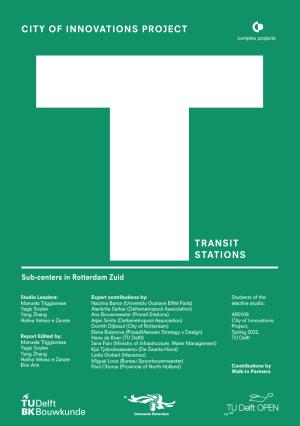Hosted by
Transit Stations: Sub-centers in Rotterdam Zuid
Synopsis
The City of Innovations Project ‘Walk-IN Stations’ is organized around speculating and projecting on future scenarios for the South of Rotterdam. Students are invited to reflect on the importance of transport networks within and extending from the city. In considering the way these networks have shaped the city through weaving the urbanities of the city center(s) and suburban areas and how they will further shape the future urban territories, this elective positions itself as a negotiation between architecture, network infrastructure, public realm, policy & governance and the territory. Stations are architectural objects which connect an area to the city’s territorial plane and have the potential to generate new urban dynamics. In the compact city the station no longer is simply the space to access mobility networks, in this informed by their dry pragmatism, but becomes an urban place of sociality and encounter - an extended public space beyond mobility itself. Furthermore, the Dutch Ministry of Infrastructure and Water Management has developed a vision on the future of Public Transport (towards 2040)1 based on new mobilities and Door-to-Door solutions. The vision was followed by the “Handelingsperspectief”, intended as an instrument to jointly map the current and future needs of PT nodes and their surroundings2. The stations of the future become hubs3, where you can transfer from one mode of transport to another. Hubs are also destinations in themselves, places to meet up, to work, to exercise, to eat. How are new mobility solutions integrated in the current system and take shape at public transport nodes, in the context of low car inner-cities (Autoluw) like in Rotterdam? Which relationships and cross-fertilizations can be significant for the design of the future urban stations in Rotterdam? How should these stations be developed in order to act as public places for collective action? How could one create an optimal mobility chain by decreasing transition friction, increasing quality of the space at station locations? This elective will attempt to answer those questions through research-by-design process, conducted by the students and tutors of Complex Projects in close collaboration with the City of Rotterdam, and enjoys the contribution of the University of Gustave Eiffel, Delta Metropool Association, De Zwarte Hond and PosadMaxwan experts on station developments.
The elective course City of Innovations is scheduled in Q3, between MSc1 design studio and MSc2 research and design studio. It attracts students from different tracks, from architecture and landscape architecture to urban planning, urbanism and management. City of Innovations guides research-by-design projects focusing on mobility and public space challenges. Teachers and students work together exploring the increasingly complex world that demands increasingly complex projects, in design and also in the way of designing.
The studio is organized with the method of charrette (period of intense design activity and short-term design project, usually developed in teams), focusing on 3 stations with different characters in Rotterdam Zuid. Research is done per station, in groups of 12 students; followed by a “stakeholder workshop”, students conclude the research result into spatial criteria and quality requirements. Departing from different priorities, the students split into smaller groups to develop different approaches for a more sustainable and inclusive station developed within the implementation of the new mobility method.


